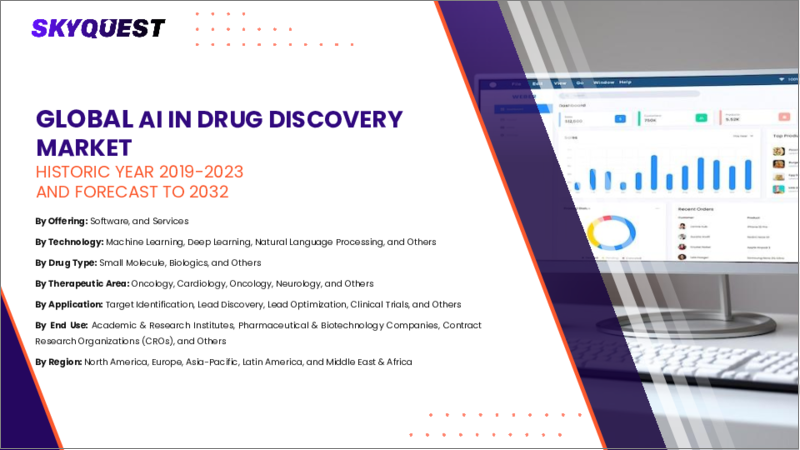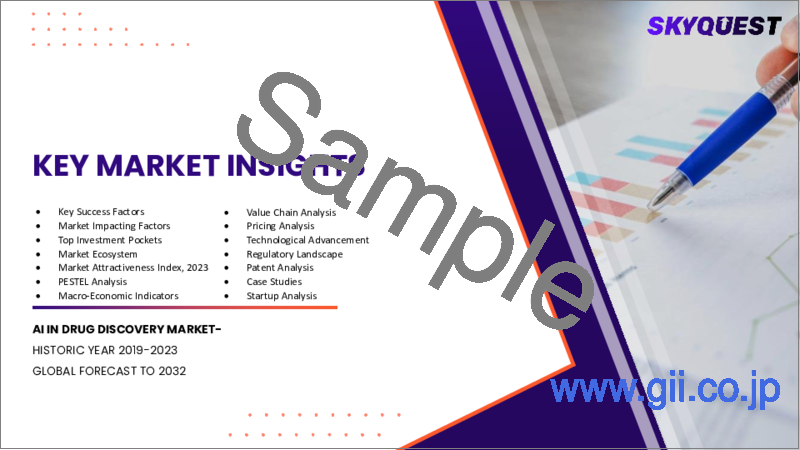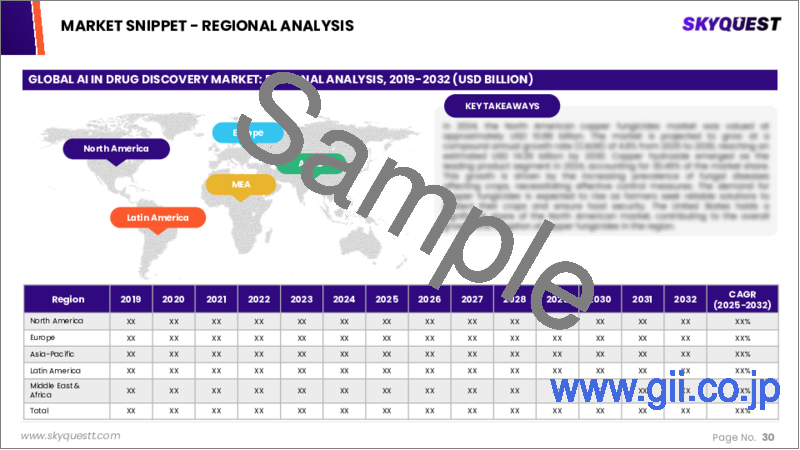|
|
市場調査レポート
商品コード
1619278
創薬におけるAIの市場規模、シェア、成長分析、コンポーネント別、技術別、用途別、地域別- 産業予測、2024~2031年AI In Drug Discovery Market Size, Share, Growth Analysis, By Component (Software, Services), By Technology (Machine Learning, Deep Learning), By Application, By Region - Industry Forecast 2024-2031 |
||||||
|
|||||||
| 創薬におけるAIの市場規模、シェア、成長分析、コンポーネント別、技術別、用途別、地域別- 産業予測、2024~2031年 |
|
出版日: 2024年12月18日
発行: SkyQuest
ページ情報: 英文 157 Pages
納期: 3~5営業日
|
全表示
- 概要
- 目次
創薬におけるAIの世界市場規模は、2022年に18億米ドルと評価され、2023年の23億4,000万米ドルから2031年には193億5,000万米ドルに成長し、予測期間中(2024~2031年)のCAGRは30.2%で成長する見通しです。
ライフサイエンス分野における革新的な治療法のニーズや製造能力の強化を受けて、AIを活用した医薬品開発ソリューションの需要が急増しています。機械学習やディープラーニングなどの技術は、初期化合物のスクリーニングや臨床試験の成功率を向上させることで、創薬に革命をもたらしています。AI用途に焦点を当てた資金調達、投資、新興企業の流入が増加しており、市場は加速度的に成長する態勢にあります。臨床試験へのAIの統合は、正確性、効率性を高め、開発サイクルを短縮することで、状況を一変させつつあります。特に、製薬企業とAI企業との戦略的提携は2015年から2020年にかけて大幅に増加しており、創薬の迅速化におけるAIの重要な役割が浮き彫りになっています。データマイニングやカスタマイズを含むAI技術の汎用性が、この上昇軌道をさらに後押ししています。
目次
イントロダクション
- 調査の目的
- 調査範囲
- 定義
調査手法
- 情報調達
- 二次データと一次データの方法
- 市場規模予測
- 市場の前提条件と制限
エグゼクティブサマリー
- 世界市場の見通し
- 供給と需要の動向分析
- セグメント別機会分析
市場力学と見通し
- 市場概要
- 市場規模
- 市場力学
- 促進要因と機会
- 抑制要因と課題
- ポーター分析と影響
- 競争企業間の敵対関係
- 代替品の脅威
- 買い手の交渉力
- 新規参入業者の脅威
- 供給企業の交渉力
主な市場の考察
- 重要成功要因
- 競合の程度
- 主な投資機会
- 市場エコシステム
- 市場の魅力指数(2023年)
- PESTEL分析
- マクロ経済指標
- バリューチェーン分析
- 価格分析
- 技術の進歩
- 規制情勢
- 特許分析
- ケーススタディ
- スタートアップ分析
創薬におけるAIの市場規模:コンポーネント別& CAGR(2024-2031)
- 市場概要
- ソフトウェア
- 機械学習
- ディープラーニング
- その他
- サービス
- 実装サービス
- メンテナンスとサポート
- その他
創薬におけるAIの市場規模:技術別& CAGR(2024-2031)
- 市場概要
- 機械学習
- 教師あり学習
- 教師なし学習
- 強化学習
- ディープラーニング
- 自然言語処理(NLP)
- その他
創薬におけるAIの市場規模:用途別& CAGR(2024-2031)
- 市場概要
- ターゲット同定
- 分子スクリーニング
- リード最適化
- 前臨床試験
- 臨床試験
- その他
創薬におけるAIの市場規模:治療領域別& CAGR(2024-2031)
- 市場概要
- 腫瘍学
- 神経変性疾患
- 心血管疾患
- 代謝性疾患
- 感染症
- その他
創薬におけるAIの市場規模:最終用途別& CAGR(2024-2031)
- 市場概要
- 製薬・バイオテクノロジー企業
- 契約研究機関(CRO)
- 学術研究機関
- その他
創薬におけるAIの市場規模& CAGR(2024-2031)
- 北米
- 米国
- カナダ
- 欧州
- 英国
- ドイツ
- スペイン
- フランス
- イタリア
- その他欧州地域
- アジア太平洋地域
- 中国
- インド
- 日本
- 韓国
- その他アジア太平洋地域
- ラテンアメリカ
- ブラジル
- その他ラテンアメリカ地域
- 中東・アフリカ
- GCC諸国
- 南アフリカ
- その他中東・アフリカ
競合情報
- 上位5社の比較
- 主要企業の市場ポジショニング(2023年)
- 主な市場企業が採用した戦略
- 市場の最近の動向
- 企業の市場シェア分析(2023年)
- 主要企業の企業プロファイル
- 会社概要
- 製品ポートフォリオ分析
- セグメント別シェア分析
- 収益の前年比比較(2021-2023)
主要企業プロファイル
- IBM Corporation
- NVIDIA Corporation
- Microsoft Corporation
- Exscientia
- Atomwise, Inc.
- BenevolentAI
- Insilico Medicine
- Cyclica
- Schrodinger, Inc.
- Cloud Pharmaceuticals, Inc.
- BioSymetrics
- XtalPi Inc.
- Deep Genomics
- Numerate, Inc.
- Berg LLC
- OWKIN, Inc.
- TwoXAR, Inc.
- Verge Genomics
- Recursion Pharmaceuticals
- PathAI
結論と推奨事項
Global AI in Drug Discovery Market size was valued at USD 1.80 billion in 2022 and is poised to grow from USD 2.34 billion in 2023 to USD 19.35 billion by 2031, growing at a CAGR of 30.2% during the forecast period (2024-2031).
The demand for AI-powered drug development solutions is surging in response to the need for innovative medical cures and enhanced manufacturing capabilities in the life sciences sector. Technologies like machine learning and deep learning are revolutionizing drug discovery by improving initial compound screening and clinical trial success rates. With a growing influx of funding, investments, and startups focused on AI applications, the market is poised for accelerated growth. AI's integration into clinical trials is transforming the landscape by enhancing accuracy, efficiency, and reducing development cycles. Notably, strategic collaborations between pharma companies and AI firms rose significantly from 2015 to 2020, highlighting AI's vital role in expediting drug discovery. The versatility of AI technologies, including data mining and customization, further propels this upward trajectory.
Top-down and bottom-up approaches were used to estimate and validate the size of the Global Ai In Drug Discovery market and to estimate the size of various other dependent submarkets. The research methodology used to estimate the market size includes the following details: The key players in the market were identified through secondary research, and their market shares in the respective regions were determined through primary and secondary research. This entire procedure includes the study of the annual and financial reports of the top market players and extensive interviews for key insights from industry leaders such as CEOs, VPs, directors, and marketing executives. All percentage shares split, and breakdowns were determined using secondary sources and verified through Primary sources. All possible parameters that affect the markets covered in this research study have been accounted for, viewed in extensive detail, verified through primary research, and analyzed to get the final quantitative and qualitative data.
Global Ai In Drug Discovery Market Segmental Analysis
Global AI in Drug Discovery Market is segmented by component, technology, application, therapeutic area, end use and region. Based on component, the market is segmented into software and services. Based on technology, the market is segmented into machine learning, deep learning, natural language processing (NLP) and others. Based on application, the market is segmented into target identification, molecule screening, lead optimization, preclinical testing, clinical trials and others. Based on therapeutic area, the market is segmented into oncology, neurodegenerative diseases, cardiovascular diseases, metabolic diseases, infectious diseases and others. Based on end use, the market is segmented into pharmaceutical & biotechnology companies, contract research organizations (CROs), academic & research institutes and others. Based on region, the market is segmented into North America, Europe, Asia Pacific, Latin America and Middle East & Africa.
Driver of the Global Ai In Drug Discovery Market
A significant driver of the Global AI in Drug Discovery market is the escalating investment in medical technology. As organizations strive for rapid advancements in drug discovery, substantial funding is directed towards research and development initiatives, especially in artificial intelligence and machine learning. These technologies not only streamline the identification of viable drug candidates but also significantly shorten the duration of clinical trials. Consequently, this leads to more efficient drug development processes, resulting in drugs reaching the market faster and at a reduced cost. The focus on innovative healthcare solutions continues to propel growth in this sector, underlining its essential role in modern therapeutics.
Restraints in the Global Ai In Drug Discovery Market
One of the main obstacles hindering the global AI in drug discovery market is the challenge of data security and privacy. Given the sensitive nature of healthcare data, there is a significant risk of breaches, leading to ethical and legal concerns. Companies in this sector must navigate strict regulations regarding data privacy and cybersecurity, which can elevate operational costs and result in delays in the adoption of AI-driven drug development solutions. As a result, the apprehension surrounding data handling can impede the growth and efficiency of AI applications in the pharmaceutical industry.
Market Trends of the Global Ai In Drug Discovery Market
The global AI in drug discovery market is witnessing a significant trend driven by the increasing application of AI in preclinical and clinical research. By leveraging advanced AI models, researchers are now able to identify biomarkers for disease progression, refine clinical trial designs, and predict patient responses with greater precision. This not only mitigates the risk of trial failures but also accelerates the testing process, ensuring timely identification of promising drug candidates. Enhanced accuracy in trial procedures and improved patient enrollment strategies are further propelling this trend, positioning AI as a crucial element in revolutionizing drug development and expediting the path to market for new therapeutics.
Table of Contents
Introduction
- Objectives of the Study
- Scope of the Report
- Definitions
Research Methodology
- Information Procurement
- Secondary & Primary Data Methods
- Market Size Estimation
- Market Assumptions & Limitations
Executive Summary
- Global Market Outlook
- Supply & Demand Trend Analysis
- Segmental Opportunity Analysis
Market Dynamics & Outlook
- Market Overview
- Market Size
- Market Dynamics
- Driver & Opportunities
- Restraints & Challenges
- Porters Analysis & Impact
- Competitive rivalry
- Threat of substitute
- Bargaining power of buyers
- Threat of new entrants
- Bargaining power of suppliers
Key Market Insights
- Key Success Factors
- Degree of Competition
- Top Investment Pockets
- Market Ecosystem
- Market Attractiveness Index, 2023
- PESTEL Analysis
- Macro-Economic Indicators
- Value Chain Analysis
- Pricing Analysis
- Technological Advancement
- Regulatory Landscape
- Patent Analysis
- Case Studies
- Startup Analysis
Global AI in Drug Discovery Market Size by Component & CAGR (2024-2031)
- Market Overview
- Software
- Machine Learning
- Deep Learning
- Others
- Services
- Implementation Services
- Maintenance & Support
- Others
Global AI in Drug Discovery Market Size by Technology & CAGR (2024-2031)
- Market Overview
- Machine Learning
- Supervised Learning
- Unsupervised Learning
- Reinforcement Learning
- Deep Learning
- Natural Language Processing (NLP)
- Others
Global AI in Drug Discovery Market Size by Application & CAGR (2024-2031)
- Market Overview
- Target Identification
- Molecule Screening
- Lead Optimization
- Preclinical Testing
- Clinical Trials
- Others
Global AI in Drug Discovery Market Size by Therapeutic Area & CAGR (2024-2031)
- Market Overview
- Oncology
- Neurodegenerative Diseases
- Cardiovascular Diseases
- Metabolic Diseases
- Infectious Diseases
- Others
Global AI in Drug Discovery Market Size by End Use & CAGR (2024-2031)
- Market Overview
- Pharmaceutical & Biotechnology Companies
- Contract Research Organizations (CROs)
- Academic & Research Institutes
- Others
Global AI in Drug Discovery Market Size & CAGR (2024-2031)
- North America, (Component, Technology, Application, Therapeutic Area, End Use)
- US
- Canada
- Europe, (Component, Technology, Application, Therapeutic Area, End Use)
- UK
- Germany
- Spain
- France
- Italy
- Rest of Europe
- Asia-Pacific, (Component, Technology, Application, Therapeutic Area, End Use)
- China
- India
- Japan
- South Korea
- Rest of Asia Pacific
- Latin America, (Component, Technology, Application, Therapeutic Area, End Use)
- Brazil
- Rest of Latin America
- Middle East & Africa, (Component, Technology, Application, Therapeutic Area, End Use)
- GCC Countries
- South Africa
- Rest of Middle East & Africa
Competitive Intelligence
- Top 5 Player Comparison
- Market Positioning of Key Players, 2023
- Strategies Adopted by Key Market Players
- Recent Developments in the Market
- Company Market Share Analysis, 2023
- Company Profiles of All Key Players
- Company Details
- Product Portfolio Analysis
- Company's Segmental Share Analysis
- Revenue Y-O-Y Comparison (2021-2023)
Key Company Profiles
- IBM Corporation
- Company Overview
- Business Segment Overview
- Financial Updates
- Key Developments
- NVIDIA Corporation
- Company Overview
- Business Segment Overview
- Financial Updates
- Key Developments
- Microsoft Corporation
- Company Overview
- Business Segment Overview
- Financial Updates
- Key Developments
- Exscientia
- Company Overview
- Business Segment Overview
- Financial Updates
- Key Developments
- Atomwise, Inc.
- Company Overview
- Business Segment Overview
- Financial Updates
- Key Developments
- BenevolentAI
- Company Overview
- Business Segment Overview
- Financial Updates
- Key Developments
- Insilico Medicine
- Company Overview
- Business Segment Overview
- Financial Updates
- Key Developments
- Cyclica
- Company Overview
- Business Segment Overview
- Financial Updates
- Key Developments
- Schrodinger, Inc.
- Company Overview
- Business Segment Overview
- Financial Updates
- Key Developments
- Cloud Pharmaceuticals, Inc.
- Company Overview
- Business Segment Overview
- Financial Updates
- Key Developments
- BioSymetrics
- Company Overview
- Business Segment Overview
- Financial Updates
- Key Developments
- XtalPi Inc.
- Company Overview
- Business Segment Overview
- Financial Updates
- Key Developments
- Deep Genomics
- Company Overview
- Business Segment Overview
- Financial Updates
- Key Developments
- Numerate, Inc.
- Company Overview
- Business Segment Overview
- Financial Updates
- Key Developments
- Berg LLC
- Company Overview
- Business Segment Overview
- Financial Updates
- Key Developments
- OWKIN, Inc.
- Company Overview
- Business Segment Overview
- Financial Updates
- Key Developments
- TwoXAR, Inc.
- Company Overview
- Business Segment Overview
- Financial Updates
- Key Developments
- Verge Genomics
- Company Overview
- Business Segment Overview
- Financial Updates
- Key Developments
- Recursion Pharmaceuticals
- Company Overview
- Business Segment Overview
- Financial Updates
- Key Developments
- PathAI
- Company Overview
- Business Segment Overview
- Financial Updates
- Key Developments






